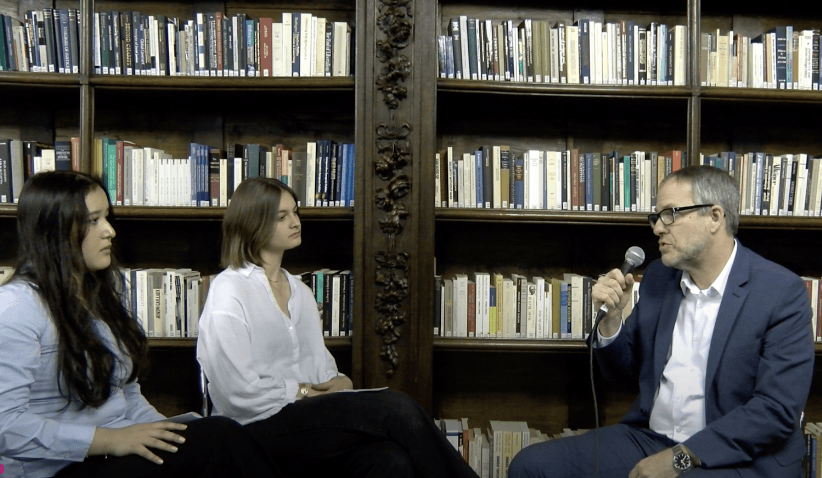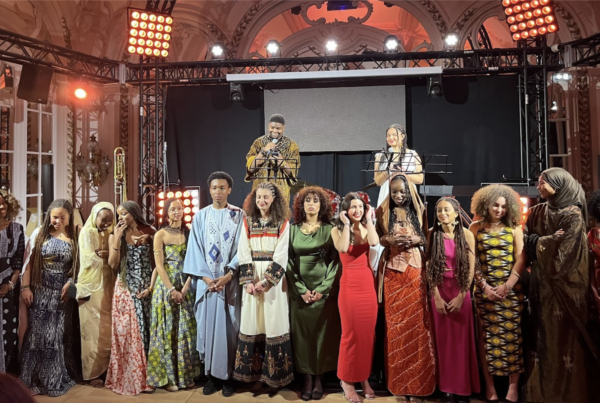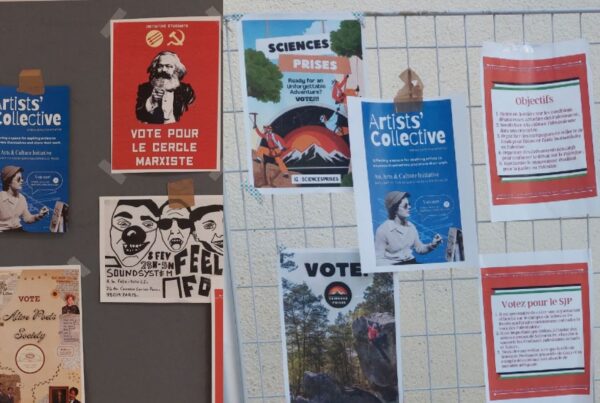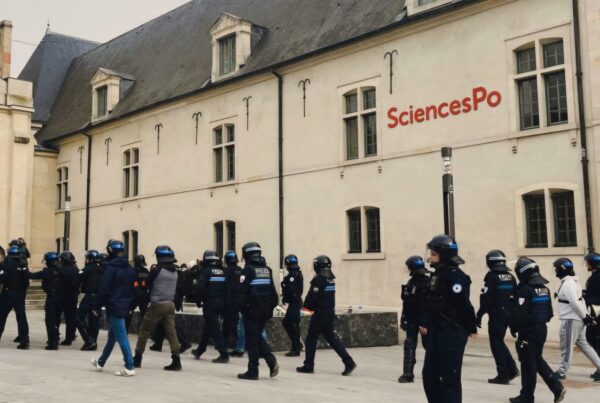On Friday, April 19, The Sundial Press spoke with US Ambassador Denise Bauer and the rest of “Mission France” in commemoration of the 80th anniversary of D-Day. After our conversation with the Ambassador, we spoke with Deputy Chief of Mission David McCawley, the second-in-command at the US Embassy in Paris. Among the topics discussed were the stakes of the upcoming US presidential election for Franco-American relations, and how France and the US can learn from their shared history to address the war in Ukraine.
Mira Chawla: Mr. McCawley, thank you for joining us. To start us off, would you mind telling us a little bit about what it is that you do at the Embassy, and why it is that you’ve decided to visit Sciences Po, specifically the Reims campus?
David McCawley: Well, great, I’m David McCawley. I’m the Deputy Chief of Mission, so that’s the number two at the Embassy. We’re actually part of what we call “Mission France,” which includes the Embassy in Paris, and we have five constituent posts across the country. We have two consulates general: one in Strasbourg, one in Marseille, and we have three very small consulates (one in Rennes, one in Lyon, and one in Bordeaux). That constitutes Mission France. We’re actually about 1100 employees across the country so it’s a big, big mission. And as the number two, I support the Ambassador and everything that she does. I’m really the Chief Operating Officer for the Mission, so I try to make everything run, I try to make sure everyone is resourced, and I provide direction in our day-to-day operations.
Erell Renaudeau: With regards to the upcoming American election, how do you believe the results of it will impact Franco-American relations today?
McCawley: Well, I’d be curious what your answer is as much as mine! But I think, as I heard the Ambassador say in that earlier interview, well, first of all, elections are really important because they are the lifeblood of any democracy. And of course, France has its own elections coming up. European elections, in this case, in June, and then the presidential elections in a couple more years. But as the Ambassador was saying, you know, elections at the end of the day don’t really impact a relationship that is 250 years in the making. Our relationships with France and with our other allies across the world are so deep and old that one election cycle isn’t going to impact it one way or the other. It’s really the people-to-people ties that are the important things over time. If you look at our relationship, our economic ties are incredible as well, right? The United States is still the largest single investor in France. France is the fifth largest investor in the United States. That’s billions of dollars of trade and investment, and it’s hundreds of thousands, actually over a million of jobs that have been created on both sides. Those types of connections don’t evaporate depending on who is sitting in the White House or who’s sitting in the Elysée Palace, right? It’s the ties between people that matter. It’s ties between students that matter, so I’m super happy to see that at this beautiful campus which I’ve not been to before but an institution like Sciences Po has links with North American universities and universities around the globe because it is the links between students which I also think are super important. Between young people in general. So as you know, we’re at the end of the Voie de Liberté tour that the Ambassador has been on. I’m actually joining it today because I had to stay back in Paris and run the operation, but it really is part of our effort to celebrate the shared sacrifices and shared values that American soldiers and free French fought for 80 years ago, and to remember those sacrifices and to apply the lessons learned from that period to the challenges today.
Mira: As Erell mentioned in the last interview with the Ambassador, this is the 80th anniversary of D-Day and the end of World War II. So, how do you believe that the US and France’s shared history of conflict, along with their continued memorial efforts, informs their collaborative effort today in addressing global challenges?
McCawley: Again, our relationship is built on shared experiences and shared values. And so we are of the same mind of what the challenges are that face us today. Some are quite immediate, like Russia’s aggression and illegal war against Ukraine, and the impact that it has on European and and actually Euro-Atlantic security. It is the crisis in the Middle East, and deadline with not only the horrific terrorist attack that took place in Israel last October, but also the humanitarian impact on the people of Gaza today. It is what is happening in Africa, as we see governments, democratic governments being undermined, threatened, and replaced by autocratic-leaning regimes. Or the rise of autocracy around the world and the threats to democracy. And I believe the Ambassador mentioned as well, I believe the most existential threat to all of us is our changing climate. How do we address that together, collaboratively? I think, first and foremost, we’re starting from a place where we’ve identified together those threats. And it’s coming up with the solutions to address them. And here, like close friends or family, we don’t always agree on how to address those challenges, we don’t always agree on how to get from point A to point B. But we fundamentally agree on the direction in which we’re going, and that’s really important. It’s also really important to disagree because there’s not one right way to do things, so in our day-to-day conversations with our French counterparts, we often disagree, but we always learn from each other in that process. At the end of the day, find paths forward that are of benefit to both our peoples.
Erell: In this context of heightened tensions, which values overarch these relations? Which values do we need to project in the world today?
McCawley: I mean, I think this is a serious time for democracy everywhere. And so I think this is something that France and the United States and our fellow democracies around the world are deeply focused on, so I think it’s rejuvenating those values in our own societies. Making sure in the day-to-day discourse and in the elections and in the choice of your leaders. So I think it’s all the values we care about: it’s about democracy, it’s about free assembly, it’s about your ability to express your ideas freely, even contrary ideas. We also believe in free economies where everyone has an opportunity to contribute to the economy, to bring their talents and to grow our economies to the benefit of workers and to ensure that the income is distributed in ways that meet people’s basic needs. And I think a real commitment to the transatlantic alliance. That’s one of the things that we’re doing this week by reflecting on how we came together 80 years ago to defeat Nazi tyranny. We have to come together today — the United States, its European partners, and its partners around the world — to really stare down the problems that are before us. Again, the rise of autocracy, challenges to our democracy (both externally and internally), a changing climate, rising global inequality, and also making sure that we’re working together to engage what our Secretary of State has now called the global majority, so the countries around the world that are looking to us to provide leadership and support in their own paths of development.
Mira: Another one of the major challenges has been the revival of violence and conflict on the European continent with Russia and Ukraine in the last couple of years. How do you think this conflict highlights the necessity of commemoration of World War II? And what lessons can the US and France and other democracies take from our history of war?
McCawley: Well, that’s it, I think we really have to be aware of what our history is, right? And it took the participation of the US and other partners to help, together with French citizens who were fighting for liberation, to secure France’s liberty and to liberate Europe from Nazi tyranny. We shouldn’t lose sight of what it took to accomplish that. I think the fact that there’s an act of war on the European continent today is a shock to everybody. And we don’t want to get to a point, I think, where the United States and our allies have to actively take on a belligerent Russia, right? At this point, what we’re all doing together is to provide the necessary support, both material and funding, and also the emotional support that our Ukrainian colleagues need to defend their country, to defend their territory, to defend their way of life. So I’m really proud of the efforts that the United States and France have taken together, along with NATO countries and allies around the world, to provide that support. We have to continue to do so. We can’t let Russia win. We can’t let countries take territory by force. Those days are long gone.
Other posts that may interest you:
- The Trouble with ‘Ecocide’
- Carbon dioxide removal – hit or miss?
- Local Victories for Turkish Opposition — A Sign of Hope?
- Are France and Japan a Mismatch Made in Heaven?
- A Reflection on Dark Tourism
Discover more from The Sundial Press
Subscribe to get the latest posts sent to your email.





